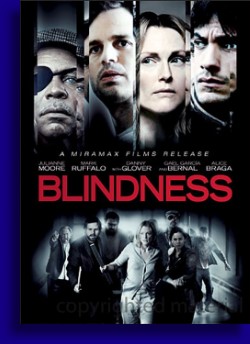

Reviewed by
Christopher Armstead


Apparently I have a thing for Hispanic directors and their apocalyptic visions of our world considering Alfonso Cuaron’s ‘Children of Men’ got my valueless vote for the best movie of 2006. Here we gifted Brazilian director Fernando Meirelles, creator of the brilliant ‘City of God’ who has helmed a film that is somewhat similar in a sense to 'Children of Men' chronicling a society that has gone all to hell in his film ‘Blindness’ which I also enjoyed, though not nearly as much as ‘Children of Men’. However I did find the story, and imagery supporting the story in top form.
In some unknown big city that obviously isn’t anywhere south of the Canadian border a Japanese dude (Yosuke Iseya) is cruising around when all the sudden his eyesight goes white. Not into darkness but into whiteness. As we big city people know, big city people aren’t the most sympathetic people on the planet, especially behind the wheels of their cars and they let the Japanese dude know, blindness are not, that he needs to get the hell off the road. Fortunately for the Japanese dude, or not so fortunately, a sympathetic man (Don McKellar) comes to his aid, drives him home then runs off with his car. The dudes wife (Yoshino Kimura) comes home and takes him to the ophthalmologist (Mark Ruffalo) who admits he’s baffled by what has inflicted the Japanese dude, as he tells his wife (Julianne Moore) the story, and sends him on to the hospital for more tests.
Then the Doctor wakes up blind. The thief ends up blind. Everybody who was in the doctor’s office at the time ends up blind and it’s looking like we have a full blown contagious epidemic on our hands, with the exception of the Docs Wife who seems to be immune to the blindness. Before you can say ‘Gestapo’ this city is in a panicked police state as the blind are rounded up and slammed into a shabbily built interment camp to fend for themselves the best that they can, and heaven help them if they wander too far away from this gated, heavily guarded interment prison. Nobody can



see, nobody knows where anything is such as toilets, showers, kitchens… with the exception of the Doctor’s Wife who refused to abandon her husband, and as such she has chosen to guide the blind through the hell of the blind wards, though she keeps the fact that she has her eyesight a secret.
As tends to happen in a police state with no structure rules or order, anarchy completely takes over in the form of the man who has declared himself The King (Gael Garcia Bernal) and has horded what few resources there are in exchange for valuables, and when the valuables run out, he settles for forced sexual favors. Squalor, filth and starvation are the order of the day followed by mayhem, chaos and eventually rebellion which might even to lead to a form of freedom… or not.
Meirelles extremely disturbing film is filled with so much allegory and symbolism that one would almost have to watch it twice and then write a term paper to discuss what all the various imagery and brutality that we are subjected to are supposed to represent. However good luck sitting through ‘Blindness’ a second time as tolerating this rather depressing film the first time through was difficult enough. What becomes of a society where there are no rules and no boundaries would seem the be the question that the movie asks, with the answer being that we will flounder into despair until someone, anyone sets up some boundaries, no matter how insane, evil or horrific. We need to be controlled. Freedom ain't nothing but a word to quote Gil-Scott Heron. This manifests itself in the Bernal’s character who declares himself king with his one power being that he has found a gun. A blind man with a gun and no extra bullets. It wouldn’t have taken much to over power the self proclaimed dictator, but he provided laws, commerce and boundaries that the residents of the blind wards apparently not only wanted but desired, despite their complaints to contrary.
It is the instances of the tiny microcosmic societal references that make ‘Blindness’ such an ambitious film and so interesting to watch for me. It’s also this ambition that also makes ‘Blindness’ a difficult film to watch as there are so many characters, relationships, sub relationships, assaultive imagery and referential imagery that the movie often becomes busy and muddled, despite the rather slow and deliberate pace of the film. The movie does feature some fine performances by some very good actors such as Gael Garcia Bernal who makes for one hell of dictator and Danny Glover who shows up, not surprisingly, as the wise old all knowing Black Dude that seems to be very popular in movies these days. Of course the movie hinges on Julianne Moore’s abilities to convey pain, frustration, support and hope along with a litany of other emotions that she has to traverse since she has to deal with the pressures of being Joan of Arc more or less, and she handles this difficult task flawlessly.
‘Blindness’ is a difficult movie and one that a lot of people will not care for due to its abject ugliness and its bleak presentation of the worst that we can become. Still it is a powerful film that I personally found captivating in its display of the ugliness of human nature, but also of the spirit of the faith that humanity can rise to in the face of such ugliness.

